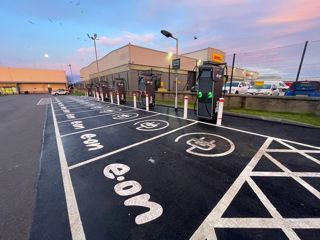André ten Bloemendal, vice president of sales in Europe at ChargePoint
Covid-19 shifted consumer expectations and business functions as the pandemic forced people to adapt to a new way of living.
People have become accustomed to the convenience of online shopping, browsing and ordering what they need without leaving the comfort of their own home, with 3.4 million more people going online for their grocery shopping compared to the same time last year.
This boom in online shopping has seen home deliveries rise exponentially which consequently means an increase in vehicles on the road as companies up capacity to meet demand.
However, as demand for deliveries grows, so does the demand for cleaner air and a more sustainable future - with a green recovery highly supported.
Lockdown caused pollution levels to drop significantly in cities across the world with people enjoying the benefits cleaner air brought and getting a sneak peak of what a clean future could look like.
As pollution levels begin to increase to pre-pandemic levels, citizens, urban planners and environmental campaigners are fighting for a greener future.
ChargePoint believes electric delivery fleets are key to keeping up with consumer demand for home deliveries as well as maintaining low pollution levels and ensuring a sustainable future.
Electric vehicles (EVs) aren’t only good for the planet—they’re good for public health.
A new Canadian study found that if all ground transport (including cars, transit and fleet vehicles) in Toronto were electric, the resulting drop in air pollution would result in annual health savings of £4.5 billion.
That means each EV on the road is worth £8,000 in life-saving benefits! Researchers say their findings “could apply to nearly every city in the world.”
For individuals and companies, it is not just an issue of environment and health.
We have a chance to, as the United Nations (UN) puts it, “build back better.”
How governments and businesses respond in the coming months will have a lasting impact on economies, health and the environment for generations to come.
Businesses need to accept the critical role they play in ensuring a green recovery and use expansion plans as an opportunity to invest in electric transport options.
For example, Amazon and DPD have announced that they will both be moving towards an electric delivery fleet as part of their climate pledges.
Such large, influential companies are not doing this purely for altruistic reasons though.
This summer, the Committee on Climate Change (CCC) reinforced its view that the mass adoption of electric vehicles as the “least-cost pathway” toward achieving the Government’s goal of net-zero greenhouse gas (GHG) emissions by 2050.
Going electric allows for business to reach policy goals of decarbonization at the lowest cost, but also does so whilst bringing down the overall cost of transport.
Fuel costs are significantly lower for EVs versus Internal Combustion Engine cars—often 50% or more—which alone can result in thousands of pounds in savings annually on a single-vehicle.
Thanks to fewer moving parts (around 20 versus more than 2,000 for a typical ICE vehicle), EVs also have far lower maintenance costs (one-third by some estimates) as well as better resale value.
A sustainable opportunity
However, the electrification of transport could offer far more support to ailing post Covid economies than just cost savings.
According to International Energy Association research, making targeted investments and implementing certain programmes such as fuel efficiency and emissions standards and scrappage schemes could save or create nearly 9 million jobs annually and boost global economic growth by more than one percent a year.
The installation and manufacturing of electric charging points alone could support around 15 high wage, high skill jobs per million pounds of investment.
So, to conclude, whilst we cannot know when this crisis will end or the damage it will have wrought by its conclusion, we should take the opportunity it offers to build back better.
Within my lifetime there has not been such an opportunity where the environment, social and economic impetus for such radical change have aligned, we must seize it.




















Login to comment
Comments
No comments have been made yet.